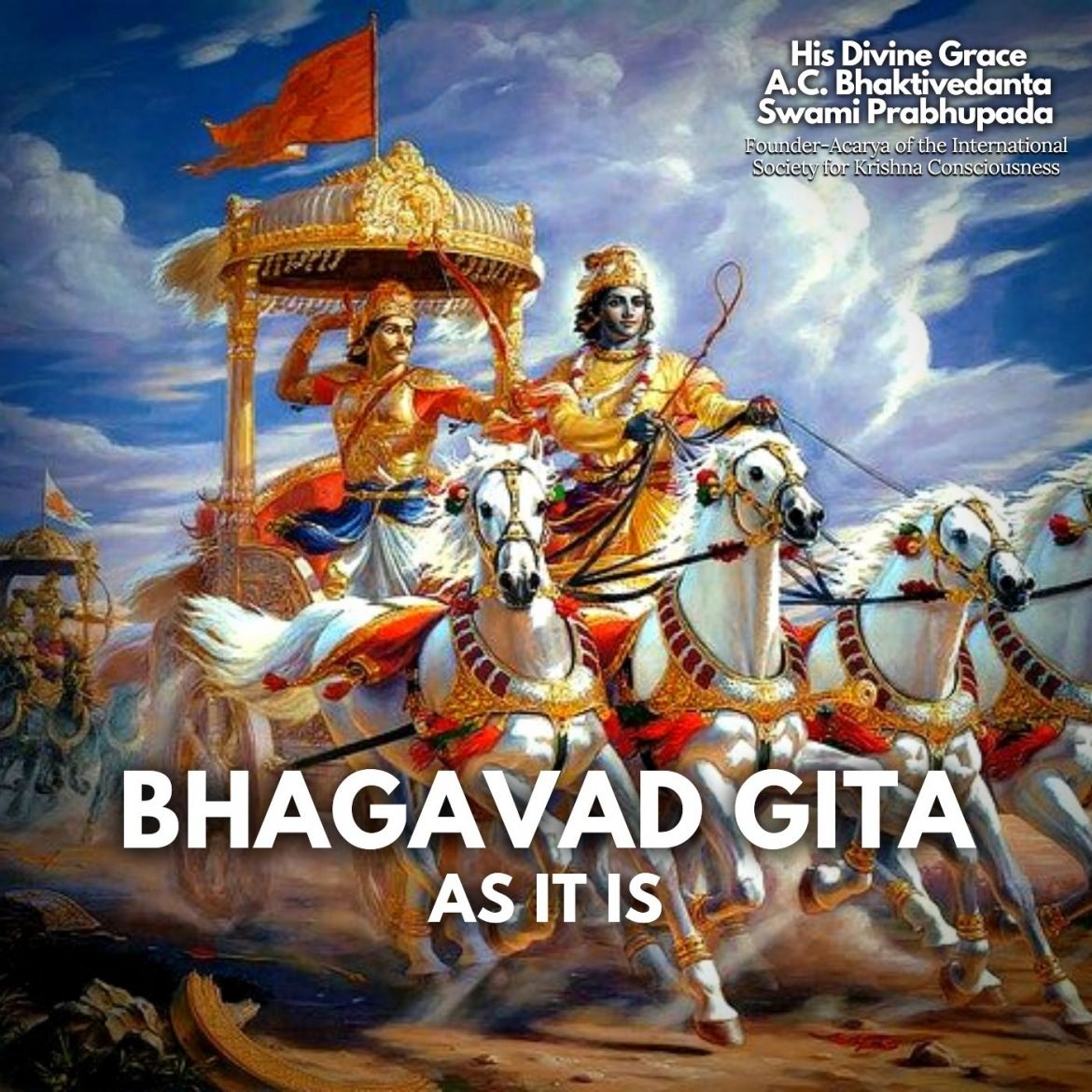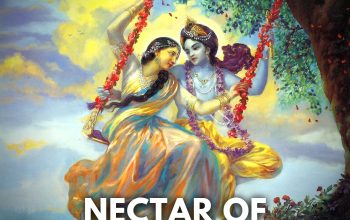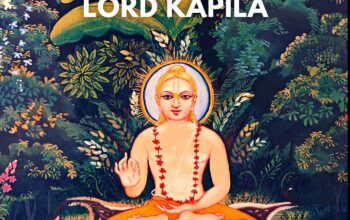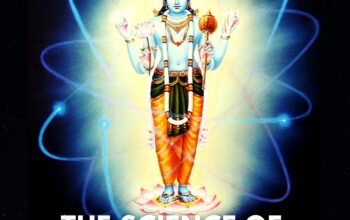The Bhagavad-gita (“Song of God”), which forms eighteen chapters in the epic Mahabharata, presents the core of the Vedic philosophy in a relatively brief seven hundred verses. Celebrated and revered for its profound message, it is the one book turned to by philosophers, yogis, and transcendentalists of nearly all paths of Vedic spirituality. In the West it early inspired, among others, the American Transcendentalists Emerson and Thoreau and has been looked to ever since for its perennial wisdom. It is the essential Vedic text for spiritual realization.
Just on the verge of the historic Battle of Kurukshetra, the warrior Arjuna loses his nerve. Totally distraught and ready to give up on life, he turns to his friend and charioteer, Krishna, for advice, “What should I do?” The conversation that follows effectively deals with humanity’s crucial questions: what is the purpose of life? What happens when we die? Is there a reality beyond this time-bound, physical plane? What is the ultimate cause of all causes? Krishna comprehensively answers all these (and more) and then reveals His own identity as none other than the Supreme Personality of Godhead, appearing on earth to usher in a new era of spiritual understanding.
Throughout the Gita Krishna teaches that the essence of all human pursuit – and the ultimate goal of all pious work, meditation, and austerity – is to develop an attitude of loving service to the Supreme Person. His ultimate instruction, “surrender to Me,” challenges Arjuna – and any reader of the Bhagavad-gita – to transcend religion and belief and to enter the realm of bhakti – devotional service – which alone can fully satisfy the self.
Bhagavad-gita As It Is is unique among Gita commentaries; the author, Srila Prabhupada, represents a line of teachers coming in disciplic succession from Krishna Himself. Prabhupada’s clarity, wit, and faithfulness to the original Sanskrit text make the teachings of the Gita easily accessible to the Western reader.
Since its publication in 1970, Bhagavad-gita As It Is has become the most widely read edition of the Gita in the world.
Episodes playlist 612 – 831

Reading books by Srila A.C. Bhaktivedanta Swami Prabhupada daily. Each of these books is a literary masterpiece, they have all the answers to any questions of life and everything necessary to uplift and nourish our soul, develop our loving relationship with God, Krishna, and help us relish our adventurous spiritual journey. Such a deep, bonafide, theological science based on Vedic scriptures has never been presented like this before. Chant Hare Krishna, dive into these books, be happy and make others happy! From Mayapur with love, Your humble servant, Sulalita devi dasi
Sañjaya said: Thus have I heard the conversation of two great souls, Kṛṣṇa and Arjuna. And so wonderful is that message that my hair is standing on end. By the mercy of Vyāsa, I have heard these most confidential talks directly from the master of all mysticism, Kṛṣṇa, who was speaking personally to Arjuna. O King, as I repeatedly recall this wondrous and holy dialogue between Kṛṣṇa and Arjuna, I take pleasure, being thrilled at every moment. O King, as I remember the wonderful form of Lord Kṛṣṇa, I am struck with wonder more and more, and I rejoice again and again. Wherever there is Kṛṣṇa, the master of all mystics, and wherever there is Arjuna, the supreme archer, there will also certainly be opulence, victory, extraordinary power, and morality. That is my opinion….📚 Ask questions via email prasnasd@gmail.com or Facebook & Instagram DMs 📚 find the book links & all episodes at sravanamdiaries.com/bhagavad-gita-as-it-is/ 📖 The Bhagavad-gita is universally renowned as the jewel of India’s spiritual wisdom. Spoken by Lord Krishna, the Supreme Personality of Godhead to His intimate disciple Arjuna, the Gita’s seven hundred concise verses provide a definitive guide to the science of self realization. No other philosophical or religious work reveals, in such a lucid and profound way, the nature of consciousness, the self, the universe and the Supreme. His Divine Grace A.C. Bhaktivedanta Swami Prabhupada is uniquely qualified to present this English translation and commentary on Bhagavad-gita. He is the world’s foremost Vedic scholar and teacher, and he is also the current representative of an unbroken chain of fully self-realized spiritual masters begining with Lord Krishna Himself. Thus, unlike other editions of the Gita, this one is presented as it is–without the slightest taint of adulteration or personal motivation. This edition is certain to stimulate and enlighten with its ancient yet thoroughly timely message | follow us on Facebook, Instagram & YouTube @sravanamdiaries | subscribe to the podcast through these links: podlink.to/sravanam

One of My Favorite Quotes
I am seated in everyone’s heart, and from Me come remembrance, knowledge and forgetfulness. By all the Vedas, I am to be known. Indeed, I am the compiler of Vedānta, and I am the knower of the Vedas.
Bhagavad Gita 15.15
If you become conscious of Me, you will pass over all the obstacles of conditioned life by My grace. If, however, you do not work in such consciousness but act through false ego, not hearing Me, you will be lost.
Bhagavad Gita 18.58
When Lord Caitanya was in Benares promulgating the chanting of Hare Kṛṣṇa, Hare Kṛṣṇa, Kṛṣṇa Kṛṣṇa, Hare Hare/ Hare Rāma, Hare Rāma, Rāma Rāma, Hare Hare, thousands of people were following Him. Prakāśānanda Sarasvatī, a very influential and learned scholar in Benares at that time, derided Lord Caitanya for being a sentimentalist. Sometimes Māyāvādī philosophers criticize the devotees because they think that most of the devotees are in the darkness of ignorance and are philosophically naive sentimentalists. Actually that is not the fact. There are very, very learned scholars who have put forward the philosophy of devotion. But even if a devotee does not take advantage of their literatures or of his spiritual master, if he is sincere in his devotional service he is helped by Kṛṣṇa Himself within his heart. So the sincere devotee engaged in Kṛṣṇa consciousness cannot be without knowledge. The only qualification is that one carry out devotional service in full Kṛṣṇa consciousness.
Bhagavad Gita 10.11 Purport



